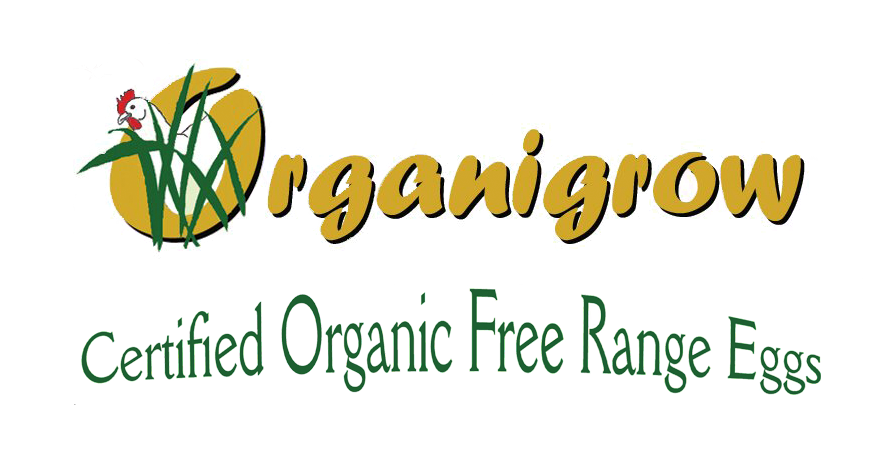Why buy Organigrow Certified Organic Free Range Eggs?
- We are Australian Certified Organic (ACO). Organigrow strives to exceed the ACO standards by improving the welfare of our hens.
- Our hens are fed Certified Organic Vegetarian feed. Often other free range organic eggs are fed meat meal from non organic sources.
- Our eggs and hens are Free from Hormones,Chemicals, Antibiotics and GMO's. You can be assured of this because we are fully certified organic and we raise the chicks from day old.
- Our hens are Free Range all day, free to roam on vast organic pastures with lots of lush herbs and grass. Our stocking density is less than 600 birds per hectare!
- Pasture fed eggs (as are Organigrow eggs!) may contain more goodness than non pasture fed eggs. ........See study on pasture fed eggs-to the right.
- We are Carbon Neutral- all greenhouse gases produced are offset by plantations of tall rainforest trees on the farm.
- Unlike other larger organic and free range producers we do not de-beak Because we give our hens an idyllic environment with plenty to occupy them and don’t overcrowd them there is no need to mutilate their beaks to stop them attacking each other
- Organigrow is an Australian family owned and run small farm. Three generations of our family work, play and live on the farm. We also provide new jobs and traineeships for our local community.
Exceptional eggs fresh from happy, healthy hens
Naturally good for you!
Our first time out of our brooders...cool. Lets feast on lush grass
Karsten and Paul Patterson, associate professor of poultry science, from Pennslyvanina University in the USA rotated 25 chickens on pastures.
During each rotation, egg samples were taken and analyzed for levels of unsaturated fat and vitamins in their yolks. The researchers then compared eggs to eggs taken from chickens raised in commercial cages on a typical grain diet. They found that the pastured birds produced about three times more omega-3 fat in their eggs than did birds raised on an industrial diet. Karsten says. Eggs from the alfalfa pasture had 25 percent more omega-3s than grass-produced counterparts. Pasturing also boosted levels of vitamins A and E. “On average, we saw about twice as much vitamin E and 40 percent more vitamin A in the yolks of pasture-fed birds than in the caged birds. The longer the animals were on pasture, the more vitamins they produced,” Karsten says. “From this study we confirmed three nutritional advantages of raising hens on pasture as compared to on an industry diet in cages: the increases in omega-3 fatty acids and in vitamins A and E. We also found that differences in omega-3 levels in plants have an effect on the eggs.
Heather Karsten, Ph.D., is assistant professor of crop production and ecology in the College of Agricultural Sciences, 251 ASI Building, University Park, PA 16802; 814-863-3179
